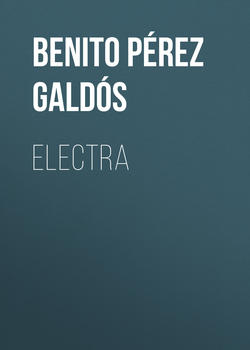Читать книгу Electra - Benito Pérez Galdós - Страница 1
INTRODUCTION
Оглавление—–
Benito Pérez Galdós, the author of the following drama, was born May 10, 1845, at Las Palmas, in the Canary Islands. Through modesty, or reserve, he has withheld every biographical detail concerning his early life. In fact his biographer, Leopoldo Alas, tells us that it was only with the greatest difficulty he obtained from him the admission that he was born in the Canary Islands. He studied there in the State College, and came to Madrid in 1863, for the purpose of reading law. This profession held but little interest for him, and he did not follow it further. He was already dreaming of a literary career, and after a brief trial of journalism, his first novel, La Fontana de Oro (1871), was published.
In 1872 his next book, El Audaz, was completed. Then taking as a model the historical novels of Erckmann-Chatrian, he began his Episodios Nacionales, which alone fill twenty volumes. Add to this number some thirty volumes of Novelas Contemporáneas, and one sees the monument that Galdós offers us of the wonderful persistence and fertility of his talent.
It is upon the Novelas that his wider literary reputation rests, for in the narration of contemporary Spanish life, in the reflection of the ideas and the sentiments of the people, he has no rival.
Comparatively little has been written by him for the theatre, but he has always been a welcome contributor and when, during the year 1900, the Director of the Teatro Español asked him for a piece for the next season he seized the opportunity of advancing, in Electra, his liberal ideas.
This drama was represented at Madrid, January 30, 1901, and made a deep impression on the Spanish people. "At the end of the first act," says the Imparcial, "the applause was frantic."
The last word of the play, "resucita," is not only the key note of the drama, but the summing up of Galdós' desires, and the expression of his ambition for his country and his countrymen.
The purpose of the play and the spirit of the author are accurately voiced by Lopez Ballesteras, in the Heraldo, January 31, 1901. "Last night," said he, "will mark a great date in history for the Spanish theatre and for liberty. It is a movement of social and political renovation, Spain demands light and liberty; she demands the right to live under modern, European conditions; she is coming to life."
O. G. B.
